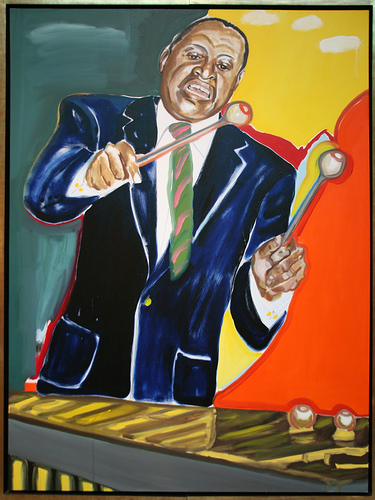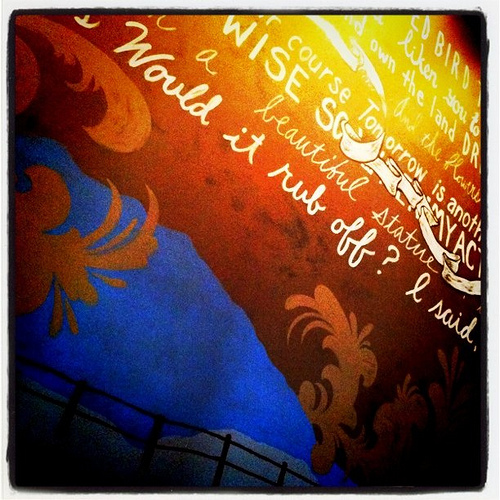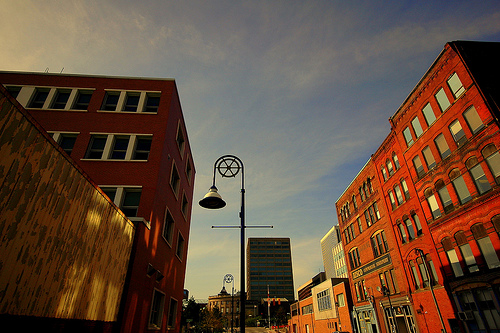Jasmina Tacheva

Photo: cliff1066™
Never has a Bulgarian citizen brought into bondage another Bulgarian, but we sure know what slavery and oppression are. What the capitalist world carelessly describes as a ‘Socialist Republic’ we call forty-five-year-long isolation spiced with prohibition of free speech, religion, Western culture and private enterprise. So, I am sure we can understand the poetry of Langston Hughes even without ever having been to Harlem during the 50’s.
Hardly can we recreate even a moderate list of the key events and battles of the Civil War and we can’t reproduce the detailed biographies of President Lincoln, Robert E. Lee or ‘Stonewall’ Jackson. Stories about the KKK may sound like a distant echo from another, too remote time and place to us. But we do know what fear, injustice, unfreedom and struggle for liberty are. The concise, vivid, melodious poems of Langston Hughes take the reader both to the entirely new world of Afro-American culture and to the soring reminiscence of something deeply familiar.
At the subway station, on the train, behind the bus wheel, in the streets, shops, restaurants, in my classroom, black people are everywhere around me. Smiling, shouting, humming, dancing; even if I close my eyes, I will recognize the color of their skin. For… there is something peculiar in the way they talk or laugh or shout – something melodic, vital, frolic, swinging, that makes me forget my troubles and leaves me completely incapable of imagining theirs. Are they ever sad? Do they ever cry? Can this wide glittering smile ever turn into a sob? Can these big jolly eyes ever fill with tears? I could even tell that Langston Hughes is black without ever having seen his picture. The black temperament has permeated into the words, rhythm, even punctuation of his poems.
Reading Langston Hughes is like riding the metro train – I can hear the frowning thirty-something man, sitting in the back, asking his much younger, licentious girlfriend: ‘Baby,’ – oh, that twisting intonation, I can’t be mistaken – ‘how come you can’t see me/ when I’m paying your bills/ each and every week?’ Or the somewhat plump black lady-driver, announcing the next station with a sigh: ’Theater marks the end of the free zone.’ – pause. Perhaps she is thinking: ‘I don’t give a damn/ For Alabam’…’ then she continues – ‘You must have a ticket or other valid proof of payment to ride beyond that station.’

Photo: rpongsaj
I can even hear the soft Southern voice of the girl from the poem ‘New Yorkers’, and imagine the tender embrace and the even tenderer kiss. Only… nowadays the ‘marching feet’ don’t roll to blues or jazz, but to break and hip hop, and I can see the young boys, holding a skateboard in one hand and their iPods in the other, boarding the train – different rhythm, but the same passion as in ‘Easy Boogie’. The ‘pop-a-da’ and ‘oop-pop-a-da’ of ‘Jam Session’ have evolved into the ‘Clickity-clank, clickity-clank/The money goes into my piggy bank’ or the ‘Uhhhhh – Yeah – Uhhhhh – Yeah” of contemporary rappers. In fact, Hughes’ be-bop scat words express the poet’s iconoclastic protest against any orthodoxy in literature just like today’s performers seek uniqueness in new forms and variations of art. This is how this rhythmical free verse resonates in my senses – it guarantees that even half a century apart from us, it bears the idiosyncrasy of the vibrant African-American culture that never changes because it is not in the diction and ideas, but in the soul – just open your senses and you will experience it even at the subway station.
However, it’s not only their music what makes the poems of Langston Hughes a story-telling experience. Every piece of art tells us a story. And stories are a crucial ingredient in our spiritual diet, because since ancient times they have been the only proven means for travelling back and forth in time and space. Indeed, when reading ‘The Negro Speaks of Rivers’, I can hear the powerful murmur of the great Euphrates, smell and taste the sweet gentle breeze of the Congo lulling the speaker to sleep, see the majestic Valley of the Kings on the western bank of the Nile, feel my eyes blinking dazzled by the golden gleam of the sun in the water of the Mississippi. I witness the birth of civilization, the erection of the pyramids, Lincoln’s journey to New Orleans. My inner ear perceives the repercussion of the verbless string of nouns in ‘Sun Song’ as I read to myself, and makes me feel the softness of the sun on my skin, the hardness of the earth under my feet and the melancholy of the elegiac black people’s song. Thus, these laconic but meaningful poems take me to times and places continents and ages away from Harlem of the 1950s. To lands where I have never been, to lands that will nonetheless give me a sense of déjà vu if I ever visit them because of the trompe l’oeil descriptions of the poet.

Photo: Number Six (bill lapp)
In his multilayered poetry I even hear the voice of a famous Bulgarian poet, executed in 1942 for communist espionage. No, I don’t believe in the trace of socialist ideas history so desperately tries to find in Hughes’s poetry and it is not the political affiliation what I consider similar between him and Nikola Vaptsarov. Aren’t the similarities obvious?
What happens to a dream deferred?
Does it dry up
like a raisin in the sun?
Or fester like a sore—
And then run?
Does it stink like rotten meat?
Or crust and sugar over—
like a syrupy sweet?Maybe it just sags
like a heavy load.
Or does it explode?A Dream Deferred by Langston Hughes
and:
How unwanted,
forgotten
And strange
are the fields !
They
have thrown in the dustbin
The sky and its dreams.
…
You must shout in the clatter
And din of machines
For your words
to pass over
The spaces between.…
Was it a life worth nothing,
A life worth digging up?
Unearthed, it reeks of poison,
Tastes bitter in the cup.
Factory by Nikola Vaptsarov
How can you forget me,
Fellow, say?
How can you low-rate me
This way?
You treat me like you damn well please,
Ignore me – though I pay your fees.
How can you forget me?…
Listen closely:
You’ll hear their feet
Beating out and beating out a –You think
It’s a happy beat?
…Where I come from
Folks work hard
All their lives
Until they die
And never own no parts
Of earth nor sky
So I come up here.
…Why should it be my loneliness,
Why should it be my song,
Why should it be my dream
Deferred
Overlong?Poems by Langston Hughes
and:
History, will you mention us
In your faded scroll?
We worked in factories, offices –
Our names were not well known.
We worked in fields, smelled strongly
Of onion and sour bread.
Through thick moustaches angrily
We cursed the life we led.
…
We died like flies in autumn.
The women mourned the dead,
Turned their lament to singing –
But only the wild grass heard.
…We who survived our brothers,
Sweated from every pore,
Took any job that offered,
Toiled as the oxen do.At home our fathers taught us:
‘So shall it always be.’
But we scowled back and spat on
Their fool’s philosophy.
…
How we were soothed by hoping! …
But leaden skies pressed lower,
The scorching wind hissed viciously …
Till we could stand no more!
For life, showing no mercy,
With heavy brutish paw
Battered our hungry faces.
That’s why our tongue is raw.History by Nikola Vaptsarov
These aren’t the poems of two alleged socialists, revolutionists or ideologists. These are the utterances of two idealists – sometimes angry, sometimes disappointed; sometimes singing, sometimes laughing, sometimes shouting. Their words are audacious and loud, but they are not words of hatred. Poetry is art. Maybe the finest among arts, for its task is the most difficult one – to create maximum impression with minimum resources (words). Besides poetry, Langston Hughes’s poems are music. Poetry and music cannot hate. If they do, they are not poetry and music. They are not art. That’s why I consider even the biggest critic in his poems a purest expression of love. Not only for his people, but for Americans, for the mankind, the world, the air that we all breathе and share:
You are white–
yet a part of me, as I am a part of you.
That’s American.
Sometimes perhaps you don’t want to be a part of me.
Nor do I often want to be a part of you.
But we are, that’s true!











No comments so far ↓
Nobody has commented yet. Be the first!
Comment